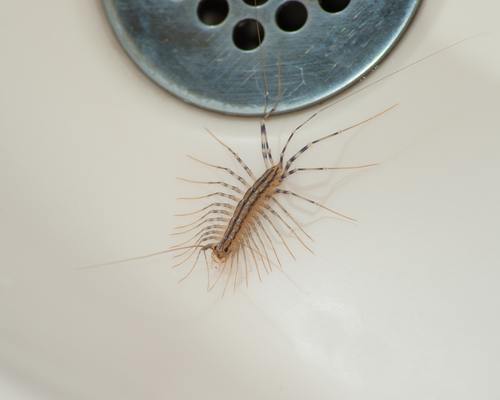Table Of Content

Beyond the initial pain caused by an attack, possible side effects include severe swelling, chills, fever and weakness. In the event of a severe allergic reaction, emergency medical services should be contacted immediately. Still, house centipedes are basically harmless to humans, and they're effective predators of other insect nuisances, including roaches, flies, silverfish, and termites. So, if you can learn to not be terrified of them, you should let them do their thing.
Are House Centipedes Venomous?
Because house centipedes help you control infestations of other, more bothersome pests, there’s little reason to exterminate them. Pesticides are of limited effectiveness in eliminating house centipedes. With their long legs, they hold their bodies high when they move, allowing them limited contact with pesticide-laden surfaces, making most pesticides less effective.
Centipedes vs. Millipedes
Eliminate the other insects in your home and the house centipede will leave to find a new food source. Other insects can include just about any insects that can get inside your home, whether or not you can see them. House centipedes do have venom, which they use to kill their prey. However, they do not bite often and, when they do, their bite is not strong enough to break human skin or to cause more than a mild reaction.
Do Centipedes Bite People?
So, you likely do not have more than a few centipedes at a time. If you kill a centipede, it’s imperative to pick up the remains and dispose of the remains correctly. Flushing the centipede down the toilet, for example, is a good way to dispose of the centipede. Centipedes are not even known to transmit diseases to humans or plants or other mammals either. As a result, they aren’t harmful to you, your family members, furry friends, or your home. Unlike with, say, ants, this method is pretty effective because you usually won’t be dealing with large centipede populations.
How to Repel and Control Centipede Infestations
The most effective way to prevent a centipede infestation is to reduce areas of moisture in and around your home. Remove piles of leaves and grass clippings, logs, stones and rocks on your property. Provide adequate ventilation in basements, attics and crawl spaces.
If you have swelling of the lips, throat, mouth, or tongue, call your local emergency services or have someone take you to an emergency room immediately. Read on to learn more about identifying and treating a centipede bite. Centipedes typically overwinter outdoors in protected situations and lay their eggs during the summer, usually in or on the soil. Females of Scutigera have been known to produced 35 eggs over a period of days. A large house centipede population may indicate an underlying pest problem. Photograph by mourad-harzallah via iNaturalist, used under a CC BY 4.0 license.
Centipede Pest Control

Yes, house centipedes are capable of biting, but they rarely do so unless they feel threatened or cornered. House centipedes are generally not aggressive toward humans and are more focused on hunting insects and other small arthropods. They prefer to avoid contact with humans and will typically flee if they sense a human presence.
Something nasty this way comes - Olive Press News Spain - The Olive Press
Something nasty this way comes - Olive Press News Spain.
Posted: Tue, 10 Aug 2010 07:00:00 GMT [source]
For one, their diet is very different – centipedes are carnivorous, while millipedes feed on decaying organic matter or roots and leaves of seedling plants. Because of this, centipedes have venom that kills their prey. One of the most effective traps for centipedes is the sticky trap. These creatures may be fast, but that won’t matter if they get stuck.
Vlogger dies live-streaming himself eating poisonous centipedes and lizards - Irish Mirror
Vlogger dies live-streaming himself eating poisonous centipedes and lizards.
Posted: Thu, 25 Jul 2019 07:00:00 GMT [source]
Pest Library
You can stop this by using an expanding foam spray to close these gaps. Below, we’ll answer all your most pressing questions, so you’ll be better prepared the next time you cross paths with a centipede—either outside or in your home. To avoid infection, use a topical antibiotic and keep the site clean and covered. She is also a Master Gardener with over 40+ years of experience and 20+ years of writing experience.
While their bites are typically not dangerous or fatal, they can hurt as centipedes will use their venom as a defence mechanism. Not to be confused with millipedes, these wriggly creatures are famous for killing pests including moths, flies and other insects around the home. While many of us want to banish their presence from our home, they may actually come in pretty useful. If you see one or two centipedes in your house, the centipedes likely just got in through some kind of crack or small crevice. Centipedes are naturally drawn to dark, damp environments, such as your bathroom or basement.
House centipedes feed on spiders, bed bugs, termites, cockroaches, silverfish, ants, and other household arthropods. These are not part of their mandibles, so strictly speaking they sting rather than bite. Despite their developed eyes, they seem to rely mostly on their antennae when hunting.
Even if house centipedes bite you, it’s considered harmless. Although they can look disgusting to some, they don’t harm humans. Their long legs allow them to run fast as they chase their prey, pounce on them, and wrap their long spindly legs around them, preventing them from escaping.

No comments:
Post a Comment